Related Research Articles
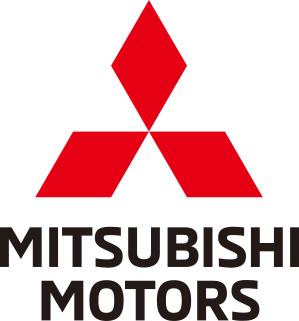
Mitsubishi Motors Corporation is a Japanese multinational automotive manufacturer headquartered in Minato, Tokyo, Japan. In 2011, Mitsubishi Motors was the sixth-largest Japanese automaker and the 19th-largest worldwide by production. Since October 2016, Mitsubishi has been one-third (34%) owned by Nissan, thus a part of the Renault–Nissan–Mitsubishi Alliance.

The Mitsubishi Fuso Truck and Bus Corporation is a manufacturer of trucks and buses. It is headquartered in Kawasaki, Kanagawa, Japan. Currently, it is 89.29% owned by Germany-based Daimler Truck.

Mack Trucks, Inc., is an American truck manufacturing company and a former manufacturer of buses and trolley buses. Founded in 1900 as the Mack Brothers Company, it manufactured its first truck in 1907 and adopted its present name in 1922. Mack Trucks is a subsidiary of AB Volvo, which purchased Mack and Renault Trucks in 2000.
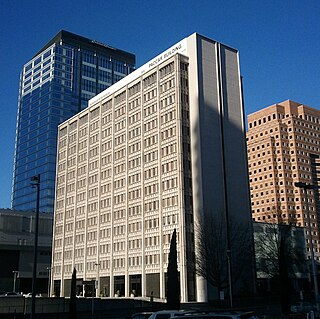
PACCAR Inc is an American Fortune 500 company and counts among the largest manufacturers of medium- and heavy-duty trucks in the world. PACCAR is engaged in the design, manufacture and customer support of light-, medium- and heavy-duty trucks under the Kenworth, Peterbilt, Leyland Trucks, and DAF nameplates. PACCAR also designs and manufactures powertrains, provides financial services and information technology, and distributes truck parts related to its principal business.

Isuzu Motors Ltd., trading as Isuzu, is a Japanese commercial vehicle and diesel engine manufacturing company headquartered in Tokyo. Its principal activity is the production, marketing and sale of Isuzu commercial vehicles and diesel engines.

Komatsu Ltd. or Komatsu (コマツ) is a Japanese multinational corporation that manufactures construction, mining, forestry and military equipment, as well as diesel engines and industrial equipment like press machines, lasers and thermoelectric generators. Its headquarters are in Minato, Tokyo, Japan. The corporation was named after the city of Komatsu, Ishikawa Prefecture, where the company was founded in 1921. Worldwide, the Komatsu Group consists of Komatsu Ltd. and 258 other companies.

Renault Trucks is a French commercial truck manufacturer with corporate headquarters at Saint-Priest near Lyon. Originally part of Renault, it has been a subsidiary of the Volvo Group since 2001.

Kenworth Truck Company is an American truck manufacturer. Founded in 1923 as the successor to Gersix Motor Company, Kenworth specializes in production of heavy-duty and medium-duty commercial vehicles. Headquartered in the Seattle suburb of Kirkland, Washington, Kenworth has been a wholly owned subsidiary of PACCAR since 1945, operating alongside sister company Peterbilt Motors.

The International Harvester Company was an American manufacturer of agricultural and construction equipment, automobiles, commercial trucks, lawn and garden products, household equipment, and more. It was formed from the 1902 merger of McCormick Harvesting Machine Company and Deering Harvester Company and three smaller manufactures: Milwaukee; Plano; and Warder, Bushnell, and Glessner. In the 1980s all divisions were sold off except for International Trucks, which changed its parent company name to Navistar International. Its brands included McCormick, Deering, and later McCormick-Deering, as well as International. Along with the Farmall and Cub Cadet tractors, International was also known for the Scout and Travelall vehicle nameplates.

Sterling Trucks Corporation was an American truck manufacturer. Founded in 1998, Sterling was created following the 1997 acquisition of the heavy-truck product lines of Ford Motor Company by Freightliner. Taking its nameplate from a long-defunct truck manufacturer, Sterling was slotted between Freightliner and Western Star within the Daimler product range.
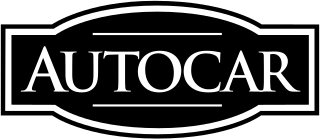
The Autocar Company is an American specialist manufacturer of severe-duty, Class 7 and Class 8 vocational trucks, with its headquarters in Birmingham, Alabama. Started in 1897 in Pittsburgh, Pennsylvania, as a manufacturer of Brass Era automobiles, and trucks from 1899, Autocar is the oldest surviving motor vehicle brand in the Western Hemisphere.
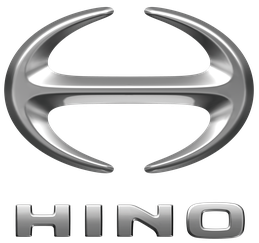
Hino Motors, Ltd., commonly known as Hino, is a Japanese manufacturer of commercial vehicles and diesel engines headquartered in Hino, Tokyo. The company was established in 1942 as a corporate spin-off from previous manufacturers.
The automotive industry in the Soviet Union spanned the history of the state from 1929 to 1991. It started with the establishment of large car manufacturing plants and reorganisation of the AMO Factory in Moscow in the late 1920s–early 1930s, during the first five-year plan, and continued until the Soviet Union's dissolution in 1991.

The Nissan Atlas is a series of pickup trucks and light commercial vehicles manufactured by Nissan. It is built by UD Trucks for the Japanese market, and by the Renault-Nissan Alliance for the European market. The lighter range vehicles, weighing from 1 to 1.5 tons, replaced the earlier Cabstar and Homer (F20), while the heavier Caball and Clipper (C340) were replaced by the 2-to-4 ton range Atlas. The Atlas nameplate was first introduced in December 1981, available at Nissan Bluebird Store locations.
Samsung Heavy Industries Co., Ltd. is one of the largest shipbuilders in the world and one of the "Big Three" shipbuilders of South Korea. Geoje is one of the largest shipyards in the world, having 3 dry docks and 5 floating docks. A core subsidiary of the Samsung Group, South Korea's largest conglomerate, SHI's main focus is on the engineering, procurement, construction, commissioning and the delivery of: transportation ships for the commercial industry, topsides modules, drilling and floating production units for the oil and gas sector, gantry cranes for fabrication yards, digital instrumentation and control devices for ships, and other construction and engineering services.

The Hayes Manufacturing Company Limited was a Vancouver-based Canadian manufacturer of heavy trucks known for their durability and a revolving bunk system. Founded in 1920, Hayes built both highway and off-road trucks, particularly for the logging industry. On a smaller scale, Hayes also manufactured buses. The Signal Company acquired a controlling stake in the company in 1969, and in 1971 renamed it Hayes Trucks. In 1975, Signal sold the company to Paccar, which closed the Hayes plants.

A substantial car industry was created in Australia in the 20th century through the opening of Australian plants by international manufacturers. The first major carmaker was Ford Australia and the first Australian-designed mass production car was manufactured by Holden in 1948. Australian manufacture of cars rose to a maximum of almost half a million in the 1970s and still exceeded 400,000 in 2004. Australia was best known for the design and production of 'large' sized passenger vehicles. By 2009 total production had fallen to around 175,000 and the Australian market was dominated by cars imported from Asia and Europe.
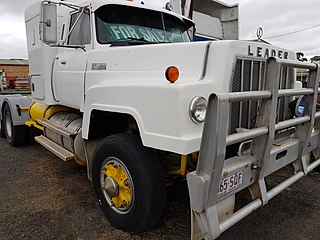
Leader Trucks was a truck-manufacturing company based in Toowoomba, Queensland, Australia. It was established as an initiative of Cyril Anderson and Western Transport. Nearly 2,000 trucks were manufactured between 1972 and 1984.

Volvo Trucks Corporation, stylized as VOLVO, is a global truck manufacturer based in Gothenburg, Sweden, owned by AB Volvo. In 2016, it was the world’s second largest manufacturer of heavy-duty trucks.